译林版(三起)英语六年级上册期末复习--一般过去时课件(共28张PPT)
文档属性
| 名称 | 译林版(三起)英语六年级上册期末复习--一般过去时课件(共28张PPT) |
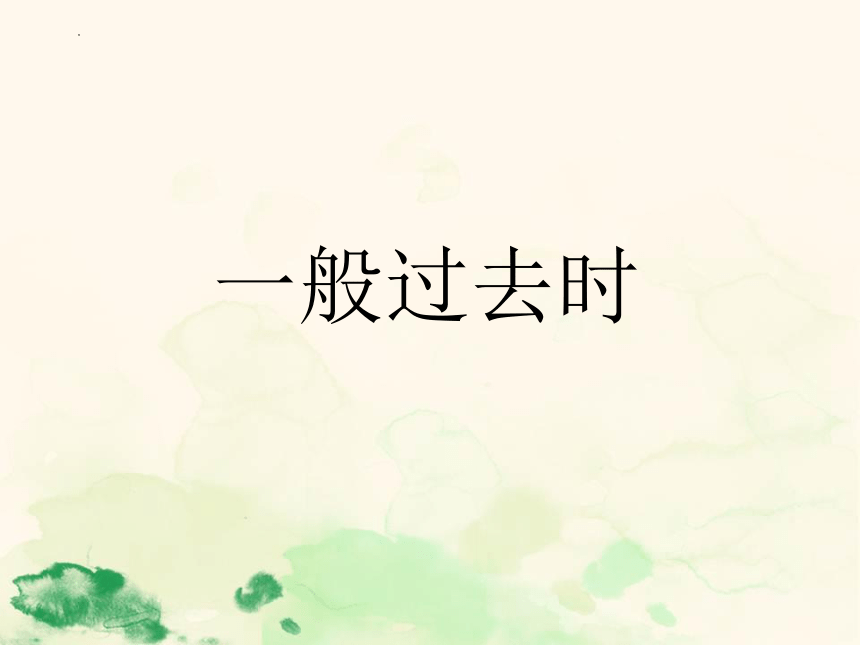
|
|
| 格式 | pptx | ||
| 文件大小 | 28.4MB | ||
| 资源类型 | 教案 | ||
| 版本资源 | 牛津译林版 | ||
| 科目 | 英语 | ||
| 更新时间 | 2023-07-22 00:00:00 | ||
图片预览





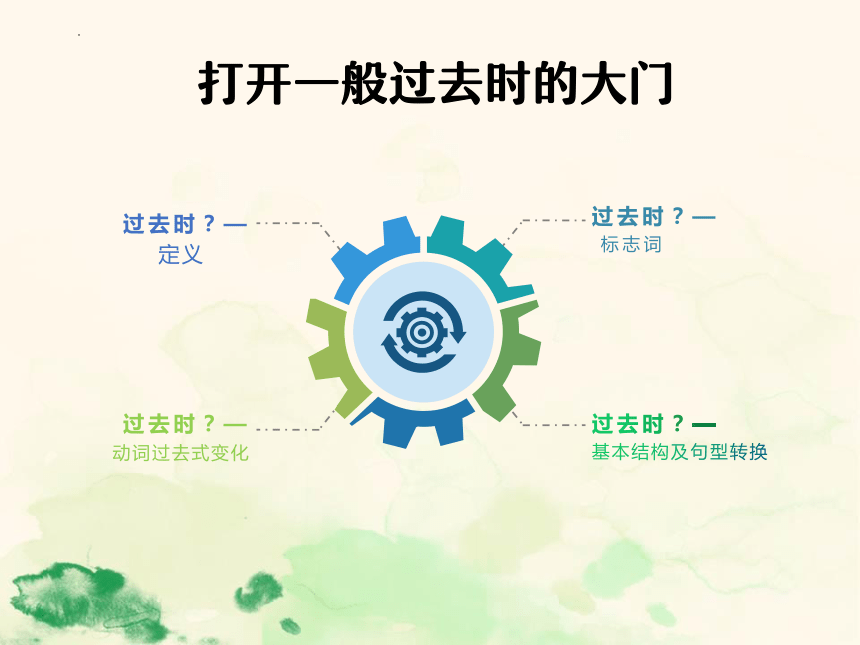
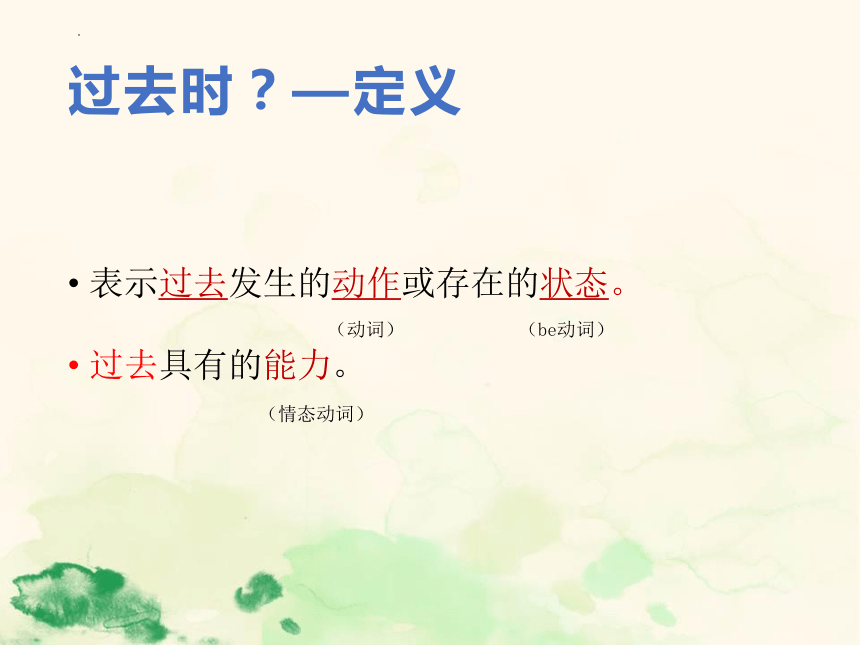
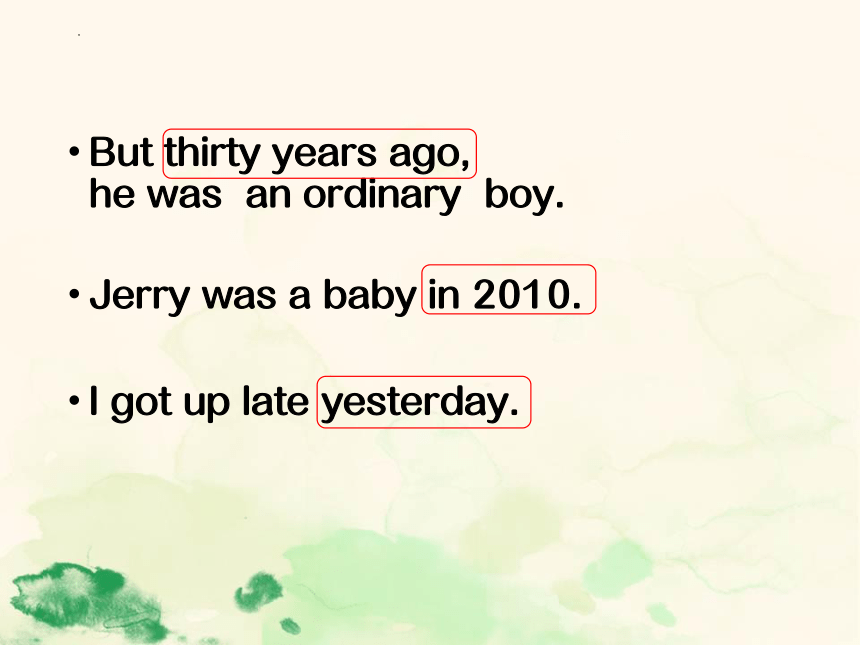
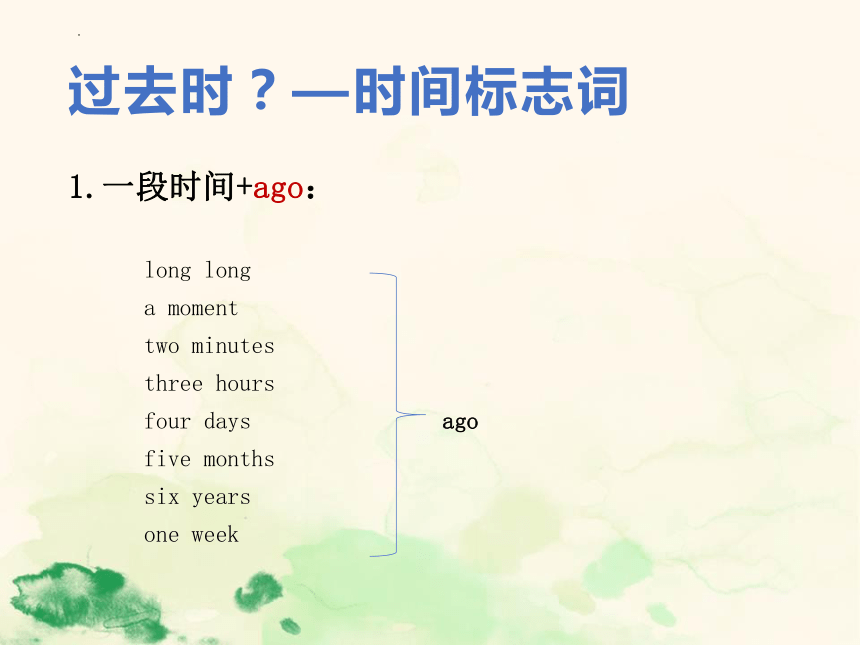
文档简介
(共28张PPT)
一般过去时
But thirty years ago,
he was an ordinary boy.
William Chan is a super star.
过去
现在
Jerry is a student now.
Jerry was a baby in 2010.
现在
过去
I get up early everyday.
I got up late yesterday.
现在
过去
一般过去时
打开一般过去时的大门
过去时?—
定义
过去时?—
标志词
过去时?—
动词过去式变化
过去时?—
基本结构及句型转换
过去时?—定义
表示过去发生的动作或存在的状态。
(动词) (be动词)
过去具有的能力。
(情态动词)
But thirty years ago,
he was an ordinary boy.
Jerry was a baby in 2010.
I got up late yesterday.
过去时?—时间标志词
1.一段时间+ago:
long long
a moment
two minutes
three hours
four days ago
five months
six years
one week
2.last+:
time
night
week
last month
tern
Monday(星期)
3.yesterday/yesterday+:
yesterday morning
yesterday evening
the day before yesterday
4.其他时间状语:
1.just now
2.at that time
3.before
4.this morning
5.then
6.in+过去年份(in 2018)
7.What happened?
过去时?—基本结构及句型转换
一般现在时:
我今年10岁。
I am ten years old this year.
他今天在上海。
He is in Shanghai today.
他们今天上学迟到了。
They are late for school today.
am/is
are
一般过去时:
我去年9岁。
I was nine years old last year.
他昨天在上海。
He was in Shanghai yesterday.
他们昨天上学迟到了。
They were late for school yesterday.
was
were
1.过去的状态:含有be动词的一般过去时
主语+was/were +其他.
am/is→was
are→were
1.My father _____ a writer now. But ten years ago,he _______ a teacher .
2.The twins ______ late for school yesterday.
3.LiuTao ______ happy because he won the game.
否定句:
结构:
I was ten years old last year.
I wasn't ten years old last year.
They were late for school yesterday.
They weren't late for schoolyesterday.
变化规则:
1.找be动词(was、were), 在be动词后面加上not
was not= wasn't
were not=weren't
主+wasn't/weren't+其他.
一般疑问句:
结构:
1.I was ten years old last year.
Were you ten years old last year?
Yes,I was./ No,I wasn't.
2.They were late for school yesterday.
Were they late for school yesterday?
Yes,they were./ No,they weren't.
变化规则:
1.找be动词(was/were),be动词提前,首字母大写
2.第一人称变第二人称
3.句号变问号
Was/Were + 主语 + 其他?
回答:Yes,主代+ was/were.
No,主代+ wasn't/weren't.
特殊疑问句:
结构:
They were late for school yesterday.
对They划线提问:
Who was late for school yesterday?
(who为主语时,谓语动词用单数形式)
2.过去发生的动作
—实意动词一般过去时:
一般现在时:
我每天步行上学。
I walk to school everyday.
I go to school on foot everyday.
He studies hard everyday.
一般过去时:
我昨天步行上学。
I walked to school yesterday.
I went to school on foot yesterday.
He studied hard last year.
主语+动词过去式+其他。
主语+动词原形/三单+其他。
过去时?—动词过去式变化规则
1、直接在动词后面加ed。
work-worked,visit-visited
2、以不发音字母e结尾的动词,直接加d。
live-lived,like-liked
3、以辅音字母+y结尾的动词,去y为i,再加ed。
study-studied
4、单词元辅结尾,且重读闭音节,先双写尾字母,再加ed。
stop -stopped
5.不规则
动词过去式ed发音规则:
1.在以清辅音结尾动词后,-ed发/t/
worked/t/;helped/t/
2.在以浊辅音或元音结尾的动词后,-ed读作/d/
lived /d/;played /d/
3.在以t,或d结尾的动词后,-ed读作/Id/
visited /Id/
wanted/Id/
shouted/Id/
动词过去式练习
play______ dance_______
walk______ swim_______
buy_____ fly______
see______ bring_______
否定句:
结构:
I walked to school yesterday.
I didn't walk to school yesterday.
She went to school on foot yesterday.
She didn't go to schoolon foot yesterday.
don't/doesn't didn't
do/does did
变化规则:
1、找be动词
2、若无be动词,找情态动词(could)
3、若无情态动词,请助动词(did)来帮助
4、did放于主语的后面,动词的前面,加上not,did not= didn't
5、动词变原形
6、some->any and->or too->either
否:主语 + didn't + 动词原形+其他?
回答:Yes,主代+did.
No,主代+didn't.
I bought some toy cars for my sister.
否:
改否定句
一般疑问句:
结构:
I walked to school yesterday.
Did you walk to school yesterday?
回答:Yes,I did./ No,I didn't.
She went to school on foot yesterday.
Did she go to school on foot yesterday?
回答:Yes,She did./ No,She didn't.
变化规则:
1、找be动词
2、若无be动词,找情态动词(could)
3、若无情态动词,请助动词(did)来帮助
4、did放于开头,首字母大写
5、第一人称变第二人称
6、动词变原形
7、some->any and->or too不变either
一般疑问句:
Did + 主语 + 动词原形+其他?
回答:Yes,主代+did.
No,主代+didn't.
I bought some toy cars for my sister.
一般疑问句:
改一般疑问句
特殊疑问句:
I went to school on foot yesterday.
1、对I划线提问:
Who went to school on foot yesterday?
2、对went to school划线提问:
What did you do on foot yesterday?
I went to school on foot yesterday.
3、对school划线提问:
Where did you go on foot yesterday?
4、对on foot 划线提问:
How did you go to school yesterday?
5、对yesterday划线提问:
When did you go to school on foot
结构:
特殊疑问词+一般疑问句?
(去除划线部分)
特殊疑问词用法总结:
特殊疑问词 意思 用法
what 什么 问物品、事件、职业、姓名等
where 在哪里 问地点、方位
when 什么时间 问日期或具体时间
who 谁 问人或拟人化的物
whose 谁的 问所属关系
why 为什么 问原因
which 哪一个 问特征/问哪一个/哪一些
how 如何 问身体精神状态、天气、方式等
一般过去时
But thirty years ago,
he was an ordinary boy.
William Chan is a super star.
过去
现在
Jerry is a student now.
Jerry was a baby in 2010.
现在
过去
I get up early everyday.
I got up late yesterday.
现在
过去
一般过去时
打开一般过去时的大门
过去时?—
定义
过去时?—
标志词
过去时?—
动词过去式变化
过去时?—
基本结构及句型转换
过去时?—定义
表示过去发生的动作或存在的状态。
(动词) (be动词)
过去具有的能力。
(情态动词)
But thirty years ago,
he was an ordinary boy.
Jerry was a baby in 2010.
I got up late yesterday.
过去时?—时间标志词
1.一段时间+ago:
long long
a moment
two minutes
three hours
four days ago
five months
six years
one week
2.last+:
time
night
week
last month
tern
Monday(星期)
3.yesterday/yesterday+:
yesterday morning
yesterday evening
the day before yesterday
4.其他时间状语:
1.just now
2.at that time
3.before
4.this morning
5.then
6.in+过去年份(in 2018)
7.What happened?
过去时?—基本结构及句型转换
一般现在时:
我今年10岁。
I am ten years old this year.
他今天在上海。
He is in Shanghai today.
他们今天上学迟到了。
They are late for school today.
am/is
are
一般过去时:
我去年9岁。
I was nine years old last year.
他昨天在上海。
He was in Shanghai yesterday.
他们昨天上学迟到了。
They were late for school yesterday.
was
were
1.过去的状态:含有be动词的一般过去时
主语+was/were +其他.
am/is→was
are→were
1.My father _____ a writer now. But ten years ago,he _______ a teacher .
2.The twins ______ late for school yesterday.
3.LiuTao ______ happy because he won the game.
否定句:
结构:
I was ten years old last year.
I wasn't ten years old last year.
They were late for school yesterday.
They weren't late for schoolyesterday.
变化规则:
1.找be动词(was、were), 在be动词后面加上not
was not= wasn't
were not=weren't
主+wasn't/weren't+其他.
一般疑问句:
结构:
1.I was ten years old last year.
Were you ten years old last year?
Yes,I was./ No,I wasn't.
2.They were late for school yesterday.
Were they late for school yesterday?
Yes,they were./ No,they weren't.
变化规则:
1.找be动词(was/were),be动词提前,首字母大写
2.第一人称变第二人称
3.句号变问号
Was/Were + 主语 + 其他?
回答:Yes,主代+ was/were.
No,主代+ wasn't/weren't.
特殊疑问句:
结构:
They were late for school yesterday.
对They划线提问:
Who was late for school yesterday?
(who为主语时,谓语动词用单数形式)
2.过去发生的动作
—实意动词一般过去时:
一般现在时:
我每天步行上学。
I walk to school everyday.
I go to school on foot everyday.
He studies hard everyday.
一般过去时:
我昨天步行上学。
I walked to school yesterday.
I went to school on foot yesterday.
He studied hard last year.
主语+动词过去式+其他。
主语+动词原形/三单+其他。
过去时?—动词过去式变化规则
1、直接在动词后面加ed。
work-worked,visit-visited
2、以不发音字母e结尾的动词,直接加d。
live-lived,like-liked
3、以辅音字母+y结尾的动词,去y为i,再加ed。
study-studied
4、单词元辅结尾,且重读闭音节,先双写尾字母,再加ed。
stop -stopped
5.不规则
动词过去式ed发音规则:
1.在以清辅音结尾动词后,-ed发/t/
worked/t/;helped/t/
2.在以浊辅音或元音结尾的动词后,-ed读作/d/
lived /d/;played /d/
3.在以t,或d结尾的动词后,-ed读作/Id/
visited /Id/
wanted/Id/
shouted/Id/
动词过去式练习
play______ dance_______
walk______ swim_______
buy_____ fly______
see______ bring_______
否定句:
结构:
I walked to school yesterday.
I didn't walk to school yesterday.
She went to school on foot yesterday.
She didn't go to schoolon foot yesterday.
don't/doesn't didn't
do/does did
变化规则:
1、找be动词
2、若无be动词,找情态动词(could)
3、若无情态动词,请助动词(did)来帮助
4、did放于主语的后面,动词的前面,加上not,did not= didn't
5、动词变原形
6、some->any and->or too->either
否:主语 + didn't + 动词原形+其他?
回答:Yes,主代+did.
No,主代+didn't.
I bought some toy cars for my sister.
否:
改否定句
一般疑问句:
结构:
I walked to school yesterday.
Did you walk to school yesterday?
回答:Yes,I did./ No,I didn't.
She went to school on foot yesterday.
Did she go to school on foot yesterday?
回答:Yes,She did./ No,She didn't.
变化规则:
1、找be动词
2、若无be动词,找情态动词(could)
3、若无情态动词,请助动词(did)来帮助
4、did放于开头,首字母大写
5、第一人称变第二人称
6、动词变原形
7、some->any and->or too不变either
一般疑问句:
Did + 主语 + 动词原形+其他?
回答:Yes,主代+did.
No,主代+didn't.
I bought some toy cars for my sister.
一般疑问句:
改一般疑问句
特殊疑问句:
I went to school on foot yesterday.
1、对I划线提问:
Who went to school on foot yesterday?
2、对went to school划线提问:
What did you do on foot yesterday?
I went to school on foot yesterday.
3、对school划线提问:
Where did you go on foot yesterday?
4、对on foot 划线提问:
How did you go to school yesterday?
5、对yesterday划线提问:
When did you go to school on foot
结构:
特殊疑问词+一般疑问句?
(去除划线部分)
特殊疑问词用法总结:
特殊疑问词 意思 用法
what 什么 问物品、事件、职业、姓名等
where 在哪里 问地点、方位
when 什么时间 问日期或具体时间
who 谁 问人或拟人化的物
whose 谁的 问所属关系
why 为什么 问原因
which 哪一个 问特征/问哪一个/哪一些
how 如何 问身体精神状态、天气、方式等
同课章节目录
